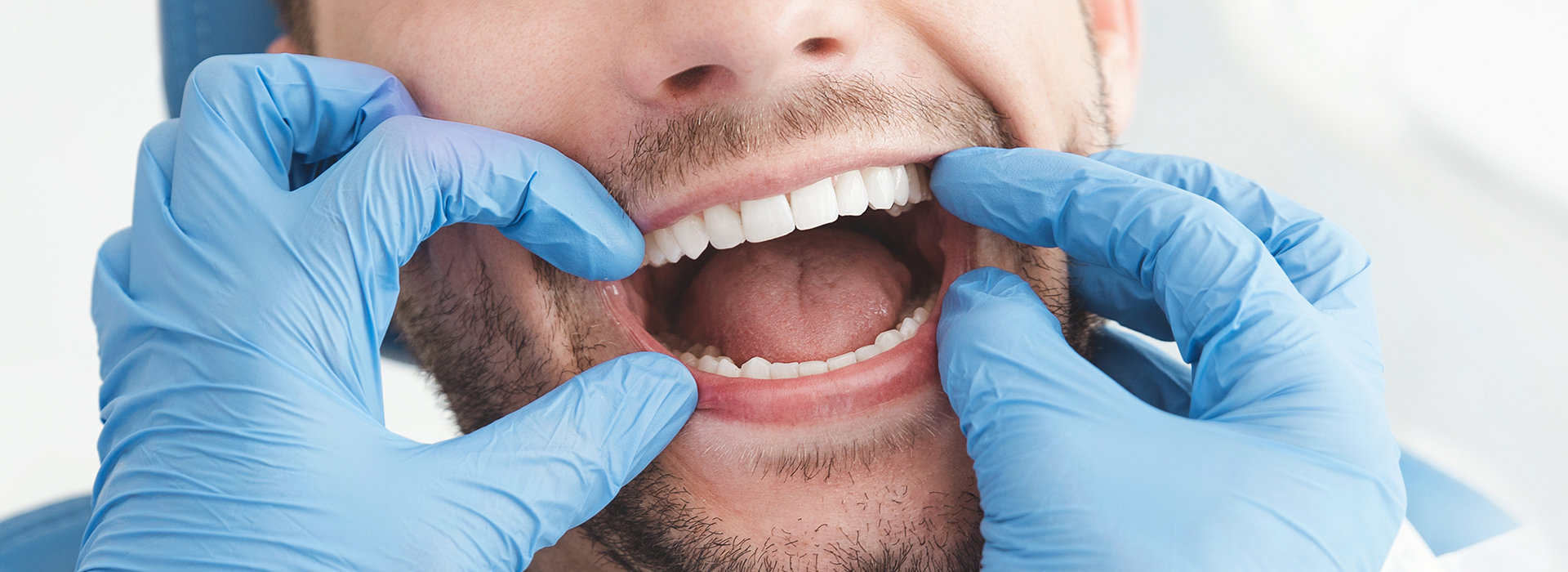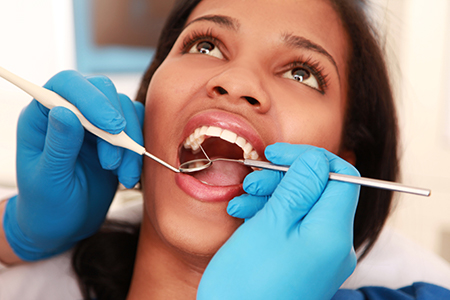
At the office of Value Dental Center, we take a proactive approach to oral health because prevention is the foundation of a long-lasting, comfortable smile. Routine oral exams give our team the opportunity to catch small problems before they grow, guide patients on daily care, and tailor a prevention plan that fits each person's needs and lifestyle. Our preventive services include comprehensive exams, professional cleanings, oral cancer screenings, and patient education on hygiene and nutrition.
Every visit is an opportunity to update your baseline dental record and to strengthen the partnership between you and your care team. By combining careful clinical observation with modern diagnostic tools, we can detect early signs of decay, gum disease, bite-related wear, and other issues that often produce few symptoms until they are more advanced. When needed, we’ll use targeted imaging and a periodontal assessment to build a clear picture of your oral health and discuss the best next steps.
Your initial exam centers on understanding your oral health history and current concerns. We begin with a thorough review of your medical and dental history so we can identify any medications, medical conditions, or habits that could affect your teeth and gums. That conversation helps us prioritize exams and screenings that are most relevant to you and your family.
Next comes a systematic clinical evaluation: we inspect teeth for signs of decay, evaluate gum health and pocket depths, check the alignment and function of your bite, and assess the temporomandibular joint (TMJ) for discomfort or abnormal movement. We also look beyond the mouth to screen the neck, face, and soft tissues for any abnormalities that warrant further attention.
Depending on what we observe, diagnostic images may be recommended to see issues that aren’t visible on the surface. Digital radiographs help identify hidden decay, bone loss, impacted teeth, or developing problems beneath the gumline. After the exam, your dentist will explain the findings in plain language, outline any necessary follow-up care, and answer your questions so you understand the rationale behind any recommendations.

Oral health is an integral part of whole-body health. Conditions that begin in the mouth can influence, and be influenced by, systemic issues elsewhere in the body. During an oral exam we screen for signs that may suggest broader health concerns, such as inflammatory conditions, nutritional deficiencies, or side effects from medications.
Researchers have identified links between chronic oral infections and several systemic diseases. Poor oral health has been associated with digestive difficulties, respiratory problems, cardiovascular disease, stroke, diabetes complications, and cognitive concerns. While a dental exam alone cannot diagnose these illnesses, it can reveal warning signs that prompt timely medical follow-up.
Conversely, many general health conditions have oral manifestations. Dry mouth, unusual oral lesions, spontaneous gum bleeding, and persistent bad breath can all be indicators of underlying systemic issues. By keeping a close watch on these signals during routine exams, we help patients and their physicians coordinate care more effectively and support overall wellness.

Maintaining a healthy smile requires more than good habits at home—professional care completes the picture. Regular checkups allow us to monitor changes over time, catch early disease, and address wear patterns caused by grinding, diet, or bite issues. Identifying small problems early usually means less invasive, more predictable treatment.
Professional cleanings remove hardened deposits (tartar) and bacterial biofilm from places that are difficult to reach with routine brushing and flossing. Because tartar cannot be removed with a toothbrush, these visits are essential to prevent gum inflammation and the progression of periodontal disease. A clean, polished mouth also helps patients feel fresher and more confident between appointments.
These visits also serve as a chance to reinforce effective home care. Our hygienists provide practical advice tailored to your needs—techniques for brushing and flossing, recommendations for interdental tools, and guidance on lifestyle choices that affect oral health. For children and teens, checkups are also the moment to monitor growth and development and advise on the need for future orthodontic or preventive treatments.
We typically recommend routine exams and cleanings at intervals that match each patient's risk profile. For many people, that means twice a year; others with a history of gum disease, frequent decay, or certain medical conditions may benefit from more frequent visits. We’ll work with you to design a schedule that supports lasting oral health.
Visual inspection tells part of the story, but diagnostic imaging reveals the structures beneath the surface. Digital x-rays provide a quick, accurate view of tooth roots, bone levels, and the spaces between teeth where decay often begins. These images are an essential complement to the clinical exam and help guide everything from simple fillings to complex restorative planning.
Modern digital radiography offers important advantages: it requires less radiation than traditional film, produces images instantly, and allows for easier storage and secure sharing when collaborative care is needed. Digital images can be enhanced to highlight areas of concern and integrated into your electronic chart to track changes over time.
For cases that require more detailed three-dimensional information—such as evaluating complex root anatomy, assessing bone for implant placement, or planning certain surgical procedures—we may recommend cone-beam computed tomography (CBCT). CBCT scans provide 3D reconstructions that enhance diagnostic confidence and help us create precise, individualized treatment plans.

Not all x-rays are the same—each type serves a specific diagnostic purpose. Periapical films isolate a single tooth from crown to root and are especially useful when assessing the health of a particular tooth or detecting root-level problems. Bitewing images focus on the crowns of back teeth and are the standard for identifying interproximal decay between molars and premolars.
A full-mouth series combines bitewings and periapicals to give a comprehensive view of all teeth when a complete baseline is needed. Panoramic films provide a broad two-dimensional view of the jaws and developing or impacted teeth and are commonly used to assess overall jaw structure. Cephalometric images capture a side profile of the skull and jaws and are valuable in orthodontic planning.
When a three-dimensional assessment is indicated, CBCT becomes a powerful tool. It allows precise evaluation of bone volume and anatomy, which is especially important for implant placement, complex extractions, or when planning surgical interventions. Your dentist will recommend the least invasive imaging option that provides the information necessary to make sound clinical decisions.
At Value Dental Center, our goal is to combine careful clinical exams with appropriate imaging and clear explanations so you can make informed choices about your care. If you have questions about what happens during an oral exam or whether you may need diagnostic imaging, please contact us for more information.
Yes. We always welcome new patients and their families for care. Feel free to give us a call or reach out to us online to schedule a first visit or for any additional information on our office. We look forward to hearing from you!
Routine dental checkups and professional cleanings help ensure your smile remains in tip-top condition and that any developing problems receive the prompt care they require. While it's a good idea to schedule a checkup and cleaning twice a year, longer or shorter intervals between routine visits depend on your specific needs.
We understand that life gets complicated and busy, and for various reasons, you haven't been able to get to the dentist for care. Don't worry; it's always a good time to get back in touch with the health of your smile.
At Value Dental Center, we offer skilled and compassionate care to address a wide range of dental needs. Whether you need a simple checkup and cleaning, restorations, periodontal treatment, root canal therapy, or the replacement of missing teeth to get your smile back into shape, we provide precise, gentle, stress-free treatment to give you a smile that is as beautiful as it is healthy.
Give us a call today; we're happy to address all your questions and concerns about getting your smile back in tip-top condition.
For pregnant women, practicing good oral care and seeing the dentist to maintain a healthy smile is considered an important component of prenatal care. Researchers have found that pregnancy not only increases the risk of oral health problems, but these problems may also lead to pregnancy complications. At the office of Value Dental Center, we provide the skilled and compassionate care required to help expectant mothers keep their teeth and gums in tip-top condition. While certain procedures are not recommended during pregnancy, we provide the necessary care and take all the necessary precautions required.
Thanks to advances in modern dentistry, teeth that have been affected by a range of imperfections or that have sustained damage from trauma or dental decay can be restored to produce a naturally beautiful looking and functional smile.
As skilled and experienced providers of care, our office can effectively improve and enhance the appearance of teeth that are stained, discolored, misshapen, chipped, fractured, gapped, crowded, or broken down due to dental decay. At the office of Value Dental Center, we offer a comprehensive selection of the leading-edge cosmetic solutions from teeth whitening procedures, dental bonding, tooth-colored fillings, and veneers, to prosthetic solutions and dental implants to rebuild complete and beautiful smiles.
Contact our office to learn more about the many ways we can help you create the smile you've always wanted.
If you're visiting Value Dental Center for the first time, it is helpful that you contact your former dental office and have your records sent over to us. Make note of any problems you may have so that you can discuss them with your dentist.
To provide efficient service, we ask you to please bring your insurance card, an ID, plus any referral slips or diagnostic records given to you by another office. If you are taking medications, please note or make a list of what they are as you will need to provide that information.
Yes! We assure you that both you and your family will be in good hands at the office of Value Dental Center.
We do our best to make sure every patient who steps into our office for care is put at ease. We provide precise and gentle care and our skilled, compassionate team strives to make every visit stress-free. You can rest assured that your smile is in the best of hands and that we are doing all we can to ensure your comfort throughout every procedure. While we always take the time to explain every step in care, feel free to ask us any questions about local anesthesia and methods of dental sedation.
At the office of Value Dental Center, we strive to provide the highest quality of care to address all your dental needs. Once we've had the opportunity to examine your smile, we can give you a clear picture of any dental issues that are present, along with a quote for what the cost of treatment will be. The cost of care all depends upon the extent and complexity of issues affecting the health or appearance of your smile and the types of procedures that are required. Our goal is to make dental care more affordable so that you can begin treatment without any additional stress or delay.
Keep in mind that with routine dental checkups and periodic care, we can help prevent dental disease while treating emerging problems early in their onset to avoid larger issues and more expensive care down the road.
Routine dental checkups and preventive care procedures may be covered under your dental insurance plan requiring little to no out-of-pocket expense. We invite you to check our financial information page or give us a call to find out if our office participates with your plan, and if you have any other questions about dental insurance, dental savings plans, forms of payment, or financing options. We welcome your inquiries and do our best to help you begin care without additional stress or delay.
If you've lost a tooth due to injury, decay, gum disease, or any other reason, we recommend dental implants to replace missing teeth. Dental implants come the closest to replicating the look, feel, and function of your natural teeth.
Absolutely! Both flossing and brushing regularly are equally important to maintain your oral health. While brushing cleans the surface of your teeth, flossing cleans in between them. Flossing is important to prevent plaque buildup, which can cause gums to recede and lead to periodontal disease.
Even if you have dentures, it is still necessary to see a dentist! Dental checkups help ensure that your dentures are comfortable, fitting properly, and that there are no other problems. Beyond assessing your dentures, our dentist will also perform a thorough examination of the jawbone, and surrounding soft tissues both inside the mouth, the face, and neck, to confirm that you remain in good oral health.
Emergency dental care is a service we hope you'll never need- but if you do, the office of Value Dental Center is here for you!
Whether you're suffering from a chipped tooth, toothache, or any problem affecting your oral health, you can be sure to get the prompt attention and compassionate care you require at our office. Patient care and comfort are our top priorities, and we offer a comprehensive range of the most advanced services to address a broad spectrum of dental needs.
While the pain of a toothache is one of the more common reasons that patients come to our office for emergency dental care, we also promptly treat emergencies that are not necessarily painful like crowns that have been dislodged and broken dentures that leave embarrassing gaps in one's smile.
You can rest assured that your oral health is in the best of hands at our office. We'll quickly determine exactly what's wrong, explain your treatment options, and then provide the precise and gentle care you require to alleviate your discomfort and get you back on the path to oral health and wellness.
Your health and comfort are our top priorities. If your dental emergency is painful, if it affects the appearance of your smile, or if you suspect that an infection is present, our office will make every effort to see you as soon as possible for care.
At the office of Value Dental Center, we welcome patients of all ages for care and offer a comprehensive range of services designed to help every member of your family maintain a beautiful and healthy smile. Whether you or a loved one needs a routine checkup and cleaning, fillings, same-day crowns, a cosmetic smile makeover, the replacement of missing teeth or require the services of a skilled and compassionate emergency dentist, you can rely on our office for the highest quality care.
For more information on our office and the many services we provide, or to schedule an appointment for care, give us a call today.
An oral exam is a systematic clinical evaluation of the teeth, gums, jaw, soft tissues, and related structures of the head and neck. The exam includes a visual inspection, palpation of glands and lymph nodes, assessment of bite and jaw function, and a review of the patient’s medical and dental history. Together these steps establish a baseline for oral health and help identify issues before they progress.
Oral exams are important because they allow early detection of cavities, gum disease, oral cancer, and other conditions that can affect overall health. Finding problems at an early stage often means simpler, more predictable treatment and a better long-term outcome. Regular exams also provide an opportunity for personalized prevention and hygiene coaching to protect your smile.
Most patients benefit from an oral exam every six months as part of a routine checkup and professional cleaning. That schedule allows your dental team to monitor changes, remove plaque and tartar, and catch developing problems while they remain easy to treat.
Some patients require more frequent visits based on individual risk factors such as a history of gum disease, frequent cavities, certain medical conditions, or tobacco use. At Value Dental Center we tailor recall intervals to each patient’s needs, which may mean visits every three to four months for those at higher risk.
A comprehensive oral exam begins with a review of your medical history, medications, and any current symptoms or concerns you may have. The clinician then conducts a head, neck, and oral soft tissue exam, evaluates gum health and pocket depths, inspects each tooth for decay or restorations, and checks bite alignment and TMJ function.
Diagnostic x-rays or other imaging may be recommended to view areas not visible to the naked eye, and the hygienist or dentist will document findings and explain what they mean. Based on those findings, the dental team will outline recommended preventive measures or treatment options and answer any questions you have about next steps.
Dental x-rays are commonly used during an oral exam to visualize the deeper structures of the teeth and jaws that cannot be seen with a visual inspection alone. X-rays can reveal cavities between teeth, the condition of roots and supporting bone, unerupted or impacted teeth, and changes beneath existing restorations.
Digital radiography is the standard practice in many offices because it produces clear images with minimal radiation exposure and allows immediate viewing and storage in the patient record. Advanced imaging, such as cone-beam CT, may be used when three-dimensional detail is needed for diagnosis or treatment planning, for example in implant or surgical cases.
An oral cancer screening is an integral part of a comprehensive oral exam and involves careful inspection and palpation of the lips, tongue, floor of mouth, cheeks, throat, and lymph nodes. The clinician looks for persistent sores, white or red patches, unexplained lumps, areas of thickening, or changes in tissue texture or color that may warrant further evaluation.
When a suspicious lesion is identified, the clinician documents its appearance and may recommend follow-up monitoring, adjunctive screening tools, or referral for biopsy to confirm a diagnosis. Early detection of oral cancer greatly improves treatment outcomes, so routine screening is an important preventive measure for all adult patients.
Oral health and systemic health are closely linked; conditions in the mouth can reflect or influence diseases elsewhere in the body. Research has shown associations between periodontal disease and systemic issues such as diabetes, cardiovascular disease, respiratory problems, and certain inflammatory conditions.
Because many systemic conditions produce signs in the oral cavity, sharing your full medical history and any changes in medications or health with your dental team helps ensure coordinated care. If oral findings suggest a medical issue, the dentist can communicate with your physician or recommend appropriate medical evaluation.
Yes, children should begin receiving oral exams early in life to establish healthy habits and monitor development. Professional organizations recommend a child’s first dental visit around the time the first tooth appears or by their first birthday, which allows the team to check growth, eruption patterns, and risk for early childhood caries.
During childhood, oral exams include education for parents about brushing, fluoride use, diet, and injury prevention, as well as application of preventive measures when appropriate. Regular exams also allow the dentist to track jaw and tooth development and identify early signs that orthodontic evaluation may be needed as the child grows.
For a first checkup bring a list of medications, relevant medical history, and any previous dental records or x-rays if available, along with your photo ID and insurance information if applicable. Having this information helps your dental team understand your overall health, medication effects, and past dental treatments that could influence care decisions.
Prepare a list of questions or concerns you want to discuss and note any symptoms such as sensitivity, pain, or bleeding gums to share during the visit. Arrive having brushed your teeth and avoid heavy meals immediately beforehand so you feel comfortable during the exam and cleaning.
The length of an oral exam varies by the complexity of the visit but most routine exams take about 20 to 45 minutes, while a comprehensive first visit with x-rays and a full periodontal assessment may take longer. Time can vary when additional diagnostics, such as digital images or specialized screenings, are needed.
Oral exams are generally comfortable and noninvasive; patients may experience brief sensitivity during probing of the gums or when x-rays are taken, but significant pain is uncommon. The dental team will explain each step, work gently, and address any discomfort or concerns to make the appointment as pleasant as possible.
After the exam the dentist reviews findings with you, prioritizes concerns, and explains recommended treatment options, including the goals and expected outcomes of each approach. The team provides clear information about preventive steps you can take at home and schedules any follow-up appointments needed to complete care or monitor conditions.
If specialized care is required, the practice will discuss referral options and coordinate with specialists to ensure continuity of treatment. Ongoing recall visits are then set based on your individual risk level to support long-term oral health and early detection of any future issues.
Quick Links